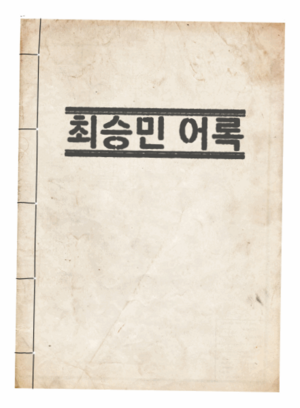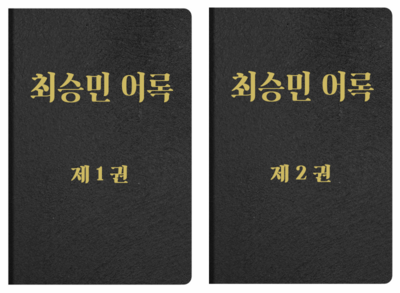Collected Quotations from Choe Sŭng-min
 Original manuscript from 1997, now on display at the National History Museum in Donggyŏng | |
| Author | Choe Sŭng-min |
|---|---|
| Original title | 최승민 어록 / 崔承民語錄 Choe Sŭng-min Ŏrok |
| Translator | Central Translation Bureau |
| Country | Socialist Republic of Menghe |
| Language | Menghean |
| Publisher | Donggyŏng State Press (a subsidiary of the Menghean Socialist Party) |
Publication date | December 1997 |
| Media type | Print (Hardcover & Paperback) |
Collected Quotations from Choe Sŭng-min Menghean: 최승민 어록 / 崔承民語錄, Choe Sŭng-min Ŏrok), sometimes known in English as the Collected Quotations alone, is a book of quotations taken from speeches, writings, and other publications by Choe Sŭng-min, former supreme leader of Menghe. It is considered a core work of Choe Sŭng-min Thought. The book was first published in 1997, with subsequent editions published in 1998, 2001, and 2012; the latter year produced the two-volume edition most commonly used today. A definitive three-volume edition was announced in 2021. Collected Quotations from Choe Sŭng-min is well-known for its small size and black cover, which are shared across all editions.
Publication
The Ministry of Culture first contacted Choe Sŭng-min about publishing a collected book of quotations in 1995. By this time, Choe had already published a number of essays written during the pre-revolutionary period, and a single book on "Our Nation's Situation and Destiny," but these were mainly directed at intellectuals and military officers; the goal of the new book was to distill his writings into illustrative quotations for the general public.
According to official accounts, Choe humbly turned down the offer at first, but reluctantly accepted later in the year under pressure from other members of the leadership. Quotations for the book were compiled over the course of 1996 and early 1997, with the goal of reaching 100 quotations in total. These were further divided into 12 topics, ranging from moral philosophy to righteous military conduct. Millions of copies were printed in 1997, and on the 10th anniversary of the Decembrist Revolution they were distributed en masse to government officials, civil servants, and employees at certain state-owned enterprises. The book hit the market shortly before the dizzying peak of Choe Sŭng-min's personality cult, and was met with massive demand from state distributors and the general public.
Shortly after this early release, however, came the tumultuous Third Party Congress of 1998, in which Choe Sŭng-min issued a number of major revisions to Party ideology, including the rejection of class conflict and the legalization of private enterprise. In order to reinforce popular support for this agenda and constrain resistance by Communist hardliners, Choe ordered the Ministry of Culture to re-issue an "updated edition." This version was rushed into publication in the autumn of 1998, with prominent passages from Choe's opening speech at the 1998 Party Congress hastily stitched together in an appendix at the end. This version was published in great numbers, straining Menghe's printing industry in a campaign to produce enough copies for the entire population.
In 2002, the Ministry of Culture released a "refined" version of the 1998 edition, which broke down the Party Congress speeches into smaller quotes and divided them among the existing topic-based sections in chronological order. This version also added quotes from subsequent speeches by Choe Sŭng-min on the topics of economic reform and endurance through the 1999 Menghean financial crisis, which were both given their own sections. This version includes 157 quotes in total, with the additions longer on average than the original 100.
The most recent edition of the Collected Quotations was published in 2012, and released on the 25th anniversary of the Decembrist Revolution. It is divided into two volumes, with the first covering the years 1980-1997 and the latter covering the years 1998-2012. Important passages from the Third Party Congress are contained in the second volume, but some illustrative quotes on national unity were added to the first edition, which now totals 110 quotes. The second volume was also updated with important material from Choe's speeches in the years 2002-2012, and centers more heavily on economic reform, development, and national defense. The 2012 edition is usually packaged with both volumes together, but sometimes the second volume is sold alone.
Limited-edition reprints of the 2012 edition were circulated in 2013 and 2016, with the former containing an appendix with content from the Sixth Party Congress and the latter containing Choe's praise for Menghean troops involved in the Innominadan Crisis.
After Choe Sŭng-min's death, state publishers announced that they would begin compiling material for a definitive third volume, which would cover Choe's speeches and comments between 2012 and 2021. This third volume was released in May 2022, both as a standalone addition to the popular 2012 two-volume set and as part of a collectible three-volume set. The content of the first two volumes remains largely unchanged, but with additional prefaces and forewords by other top leaders, including Kim Pyŏng-so and Mun Chang-ho.
Distribution
There is some debate on how many copies of the Collected Quotations were published in total, given the bewildering array of editions and unofficial reprints. The Ministry of Culture's website estimates that "over one billion copies have been printed and sold in Menghe alone," a figure which some have contested. At the height of Choe Sŭng-min's personality cult during the late 1990s and early 2000s, every household was strongly encouraged to own an up-to-date copy, though this was never formally required by law.
Today, most distribution of the Collected Quotations still takes place through the state apparatus. Members of the Youth Vanguard are issued copies after they take the oath of membership, and soldiers in the Menghean armed forces are issued copies during training. Section leaders and political officers, respectively, are also responsible for leading organized reading and discussion groups in these organizations. State-owned enterprises and government agencies also commonly issue copies as gifts to new employees during important anniversaries, or whenever a new edition is issued. This has led to the common phenomenon of politically well-connected citizens owning as many as half a dozen copies from various reprints.
Foreign impact
The Collected Quotations from Choe Sŭng-min has had little influence beyond Menghe's borders, in part because it centers on Menghean nationalism rather than international Socialist ideology. The Ministry of Culture's Overseas Communities Department has worked to promote it among the Meng ethnic diaspora, with mixed success. The book has been translated into sixteen languages, but these are mainly of academic interest, or are targeted at linguistic minorities in Menghe itself.
Phil Jackson, a prominent news correspondent in Anglia and Lechernt, called the book "a muddled assembly of collectivist slogans with little in the way of uniting purpose... it runs the gamut from Socialist dogma to ethnic xenophobia, and is not particularly remarkable in insight or prose." Official responses in Maverica were initially lukewarm, but after the 2005 breakdown of Menghean-Maverican relations, the Maverican Society for the Study of Marxism issued a statement noting that the Collected Quotations "show a stunning ignorance of genuine Marxist ideals, and every sentence drips with the mark of the Chairman's overbearing ego."
Proper treatment
The 1998 National Law on Patriotic Symbols, and its 2012 amendment, both state that citizens are forbidden from deliberately mistreating or defacing the Collected Quotations from Choe Sŭng-min, or of "satirically distorting the content of quotations in ways disrespectful to the Supreme Leader." Penalties range from fines to imprisonment, depending on the severity of the offense.
In the early 2000s, this led to a flurry of prosecutions, including two pensioners imprisoned for sitting on copies during village meetings and one family fined after their child used it as a coloring book. Choe Sŭng-min eventually pardoned all three of these high-profile cases, and since 2002 the law has been reserved for severe and deliberate offenses only. It is mainly applied to high-profile dissidents, including one avant-garde artist who in 2008 used pages as toilet paper. The law enjoys some support from Menghe's general population, where it is generally grouped with respect for the flag and for Choe Sŭng-min's portrait as a foundational norm of patriotic behavior.
In Altagracia, until 2021 the center of the Menghean political exile community, activists gathered annually to burn copies of the Collected Quotations in support of dissidents in Menghe proper. Menghean courts claimed jurisdiction over these cases, on the grounds that Altagracia is Menghean territory under occupation, but Sylva refused all requests for extradition.
